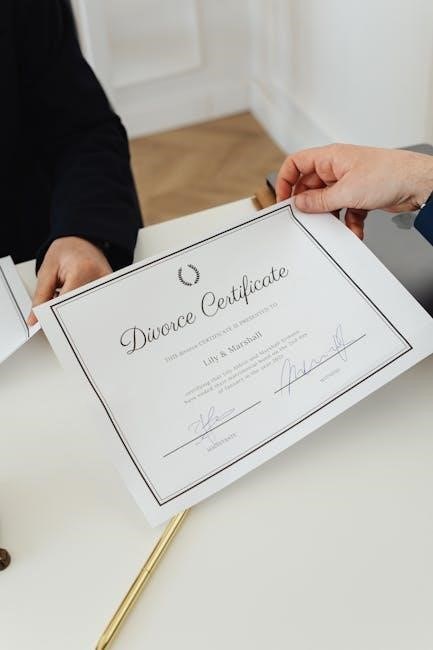Colorado divorce papers are official documents required to initiate and finalize a divorce. They include forms like JDF 1011 and JDF 1102, available in PDF format online.
1.1 Overview of Divorce in Colorado
In Colorado, divorce is based on irretrievable breakdown of marriage. The process involves filing a petition, summons, and other forms like JDF 1011 and JDF 1102. Either party must reside in the county where the divorce is filed, ensuring compliance with state residency requirements.
1.2 Importance of Using Official Forms
Using official Colorado divorce forms ensures compliance with legal standards. These forms, available in PDF, provide structure and clarity, reducing errors. Properly completed forms facilitate smoother processing, minimizing delays and legal complications, ensuring all necessary information is accurately captured for court review.

Where to Obtain Divorce Forms
Colorado divorce forms are available online in PDF format through the Colorado Judicial Branch’s Self-Help Center or can be obtained from local court clerks’ offices for a fee.
2.1 Official Sources for Colorado Divorce Forms
The Colorado Judicial Branch website provides official divorce forms in PDF format, including JDF 1011 and JDF 1102. These documents are essential for initiating and processing a divorce in Colorado courts.
2.2 Accessing Forms Online
Colorado divorce forms are accessible online through the Colorado Judicial Branch website. Visit the Self-Help Center or the Forms tab to download PDF versions of necessary documents, ensuring you use the most current versions for your legal proceedings.
2.3 Obtaining Forms from Court Clerks
Court clerks provide physical copies of Colorado divorce forms. Visit the clerk’s office at locations like Jefferson County Parkway in Golden to access forms. Some forms are available at no cost online, while others may require a fee when obtained in person.
Required Forms for Divorce
Key Colorado divorce forms include JDF 1011 (Petition), JDF 1102 (Summons), JDF 1103 (Response), JDF 1115 (Separation Agreement), and JDF 1317 (Affidavit for Decree Without Appearance).
3.1 JDF 1011 ⎻ Petition for Divorce or Legal Separation
JDF 1011 initiates divorce or legal separation in Colorado. It outlines marriage details, grounds for dissolution, and requests for property division, child custody, and support. Proper completion is crucial for court acceptance and proceeding with the case efficiently.
3.2 JDF 1102 ⸺ Summons for Dissolution of Marriage or Legal Separation
JDF 1102 is a legal document that notifies the respondent of the divorce or separation filing. It must be served to the respondent, ensuring they are aware of the case and the required actions to respond within the specified timeframe.
3.3 JDF 1103 ⎻ Response to Petition for Dissolution of Marriage or Legal Separation
JDF 1103 allows the respondent to formally reply to the divorce or separation petition. It must be filed within 21 days of receiving the summons, outlining agreements or disputes regarding the petition’s terms and requesting a court hearing if necessary.
3.4 JDF 1115 ⎻ Separation Agreement
The JDF 1115 form outlines the agreed-upon terms between spouses regarding property division, debt allocation, and spousal maintenance. It must be signed by both parties and notarized, ensuring a legally binding agreement that simplifies the divorce process.
3.5 JDF 1317 ⎻ Affidavit for Decree Without Appearance of Parties
This affidavit, JDF 1317, allows parties to request a divorce decree without appearing in court. It must be signed, notarized, and submitted with a completed separation agreement, ensuring all terms are agreed upon and legally enforceable;
Steps to Complete Divorce Papers
Complete Colorado divorce papers by filling out forms like JDF 1011 and JDF 1102, ensuring accuracy. Notarize where required and submit all documents to the court for processing.
4.1 Filling Out the Petition
Filling out the JDF 1011 Petition requires accurate personal and marital details, property information, and child-related specifics. Ensure all sections are completed clearly to avoid delays in the divorce process.
4.2 Completing the Summons
The JDF 1102 Summons must be filled out with the court’s information, case number, and parties’ details. It notifies the respondent of the divorce filing and outlines the required response timeframe and procedures.
4.3 Preparing the Separation Agreement
The JDF 1115 Separation Agreement outlines the division of assets, debts, and parenting plans. Both parties must sign it, ensuring clarity on mutual agreements. This document streamlines the divorce process and reduces disputes.
4.4 Finalizing the Affidavit
The JDF 1317 Affidavit must be completed and notarized. It verifies the accuracy of the information provided in the divorce papers. Both parties may need to submit this affidavit to proceed without a court appearance, ensuring a smoother process.
Filing Divorce Papers in Colorado
Filing involves submitting completed forms to the court, paying required fees, and serving papers to your spouse. Ensure accuracy to avoid delays in the divorce process.
5.1 Submission Process
The submission process involves delivering the completed divorce papers to the court clerk’s office. This can be done in person or by mail. Ensure all forms, including the Petition and Summons, are signed and notarized. A filing fee must accompany the documents.
5.2 Filing Fees
Filing fees for divorce in Colorado typically range between $230 and $300, depending on the county. Additional costs may apply for services like document delivery or court fees. Payment must be made at the time of filing, usually by cash, check, or credit card.
5.3 Serving the Papers
Serving divorce papers involves delivering the Petition and Summons to your spouse. This can be done through personal service by a process server or law enforcement, or your spouse can waive service by completing JDF 1102(a). Proof of service must be filed with the court.

Legal Considerations
Colorado divorce involves legal aspects like automatic temporary injunctions, parenting plans, property division, and name restoration. These ensure fair proceedings and protect both parties’ rights throughout the process.
6.1 Automatic Temporary Injunctions
Upon filing divorce papers in Colorado, automatic temporary injunctions take effect, restricting both parties from transferring assets, incurring debt, or changing insurance coverage. These injunctions aim to preserve financial stability until the divorce is finalized and ensure fair division of marital property.
6.2 Parenting and Child Support
Colorado requires parents to submit a parenting plan outlining custody arrangements. Child support calculations are based on income and expenses, ensuring fair financial responsibility. Forms like JDF 1115 and JDF 1317 assist in documenting these agreements for court approval and enforcement;
6.3 Property Division
Colorado law requires equitable distribution of marital assets and debts. Both parties must disclose all property, including real estate, vehicles, and financial accounts. The separation agreement (JDF 1115) helps document how assets are divided, ensuring a fair and legally binding arrangement for both spouses.
6.4 Name Restoration
Parties can request a name restoration during divorce proceedings. This is typically included in the Petition (JDF 1011) or Response (JDF 1015). Alternatively, a Motion for Name Restoration (JDF 1824) can be filed separately to revert to a prior name, ensuring legal recognition of the change.

Support and Resources
Colorado offers self-help centers, legal assistance, and online tools to guide individuals through divorce processes. Resources include form downloads, step-by-step instructions, and access to legal aid for smooth proceedings.
7.1 Self-Help Centers
Self-help centers provide free access to Colorado divorce forms, instructions, and guidance. Located in courthouses, they assist individuals in navigating the legal process, ensuring proper form completion and submission for uncontested or complex cases efficiently.
7.2 Legal Assistance
Legal assistance is available through attorneys and online platforms, offering tailored guidance for completing Colorado divorce forms. Services include document preparation, filing, and court representation, ensuring compliance with state laws and a smooth legal process for all parties involved effectively.
7.3 Online Tools and Guides
Online tools and guides provide step-by-step instructions for completing Colorado divorce forms. Websites offer downloadable PDF templates, checklists, and FAQs, ensuring accurate preparation and submission of documents like JDF 1011 and JDF 1102 for a smooth legal process without legal representation if desired by the user.
Name Restoration
Name restoration in Colorado allows individuals to revert to a prior name post-divorce. This can be requested in the divorce petition (JDF 1011) or via a separate motion (JDF 1824).
8.1 Requesting Name Change
To request a name change in Colorado during divorce, individuals can include their name restoration request in the divorce petition (JDF 1011) or file a separate motion (JDF 1824) with the court, restoring their name to a prior full name before marriage.
8.2 Filing Motion for Name Restoration
To restore a prior name, individuals must complete and file JDF 1824 ⎻ Motion for Name Restoration. This form is submitted to the court where the divorce decree was issued, requesting the name change after the divorce is finalized.

Divorce with Children
Divorce involving children requires specific forms for parenting plans and child support. Forms ensure legal arrangements for custody, visitation, and financial support, protecting the child’s best interests.
9.1 Required Forms
When filing for divorce with children, specific forms are mandatory. These include JDF 1011 (Petition for Divorce), JDF 1102 (Summons), and JDF 1317 (Affidavit for Decree Without Appearance). Additional forms address parenting plans and child support calculations to ensure proper arrangements for minors.
9.2 Parenting Plans
A parenting plan outlines custody arrangements, visitation schedules, and decision-making responsibilities; Colorado requires detailed plans to ensure the child’s best interests, covering residential arrangements, communication, and dispute resolution. Parents must submit this plan with their divorce paperwork for court approval.
9.3 Child Support Calculations
Child support in Colorado is calculated using specific guidelines, considering parents’ incomes, custody arrangements, and children’s needs. The court evaluates financial contributions and living expenses to ensure fair support. Parents can use official worksheets or seek legal assistance for accurate calculations.

Court Procedures and Timelines
Colorado divorce procedures involve filing, serving papers, and court hearings. Timelines vary, with cases typically resolving within 3-6 months after filing. Mandatory waiting periods apply.
10.1 Filing to Final Decree
The process from filing to final decree in Colorado typically takes 3-6 months. After filing, papers are served, and the court reviews the case. A mandatory waiting period applies before the decree is finalized, ensuring all legal requirements are met.
10.2 Mandatory Waiting Periods
Colorado imposes a mandatory waiting period of at least 91 days after filing divorce papers. This period allows for reconciliation and ensures all parties have time to respond and prepare necessary documentation before the court finalizes the decree.
10.3 Court Hearings
Court hearings in Colorado divorce cases are scheduled to finalize the decree, especially in uncontested cases. Both parties may be required to appear, and the judge will review the agreement before issuing the final divorce decree.

